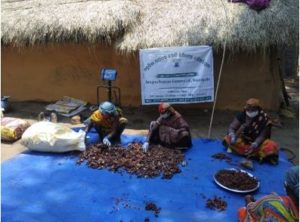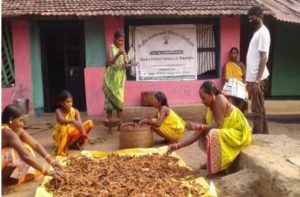‘Sabujima’ Unlocks Market Linkages for Tamarind Producers during Corona Pandemic
People across of the globe are passing through an unprecedented challenging time because of the Covid-19 pandemic. Social isolation has become paramount to arrest the outbreak. Current lock down has unsettled the tribal life and livelihoods significantly. Owing to restrictions imposed by both the State and district administration, the NTFP collection and harvesting of crops seems two emerging issues for the poor tribals of Koraput at this juncture. NTFP collectors were futile to sell their products resulting in impact huge household income.
 Sabujima Producer Company Ltd (SPCL) is a tribal women producer collectives established during 2017 in Boipariguda block of Koraput district, Odisha. The collectives work on aggregation and value addition of forest and agro produces grown by its members. Produces get value added in different form and size depending upon the market requirements. Produces like, Tamarind, wild Honey, Amla, Turmeric and Millets are taken into second and third level of value addition. The practice of value addition mostly undertaken at household level by the members and the remaining at the central processing unit setup by the company.
Sabujima Producer Company Ltd (SPCL) is a tribal women producer collectives established during 2017 in Boipariguda block of Koraput district, Odisha. The collectives work on aggregation and value addition of forest and agro produces grown by its members. Produces get value added in different form and size depending upon the market requirements. Produces like, Tamarind, wild Honey, Amla, Turmeric and Millets are taken into second and third level of value addition. The practice of value addition mostly undertaken at household level by the members and the remaining at the central processing unit setup by the company.
Tamarind is a Non-timber forest produce largely collect from forest area by the maximum shareholders of the Collectives. Corona pandemic and followed by the lockdown situation, huge Tamarind produce collected from forest required market linkage. As villages were disconnect from mainstream market, the traders were unwilling to lift product from villages. Even, Tribal Development Cooperative Corporation (TDCC), being a marketing agency promoted by the Government of Odisha to procure minor forest produces with Minimum Support Price (MSP) failed to reinstate their system in this crisis period. SPCL Board of Directors along with Corona warriors & frontline community volunteers of CYSD were in regular touch with each other to find out possible solution for marking of tamarind.
 In a monthly Board of Directors meeting, decision was taken to procure seedless tamarind from its members to give the producers additional labour engagement and minimise risk of produce. In between some regular buyers were contacted by the company for sale of seedless tamarind but their response was very frosted taking the plea of lockdown and market slow down. They too started bargaining with the company in terms of price and quality. Finally, two buyers shown interest to procure the produce in good price with agreed term and condition of the Company.
In a monthly Board of Directors meeting, decision was taken to procure seedless tamarind from its members to give the producers additional labour engagement and minimise risk of produce. In between some regular buyers were contacted by the company for sale of seedless tamarind but their response was very frosted taking the plea of lockdown and market slow down. They too started bargaining with the company in terms of price and quality. Finally, two buyers shown interest to procure the produce in good price with agreed term and condition of the Company.
“A challenge cropped up before us when the producers at the ground demanded net cash for selling their products. The company had very limited working capital to procure all products at a time. Besides, storage capacity was another issue where we struggled a lot”, shared Mani Majhi, Chairperson of SPCL.
“Besides, during summer, usually Koraput experiences rain in each alternate day. Hence retaining quality of product intact became a challenge for the company and the buyers too set a condition for taking good products only”, added Mani.
In spite of all hurdles, the company procured seedless tamarind in phased manner from the producers and reworked on quality parameter and standard packaging at the central go-down. Meantime, one of the final buyers denied to procure the produce from Koraput region showing transportation issues. These products were supposed to deliver in Mundra port of Ahmedabad for export. “Tension continued for a few days and finally, we were able to deliver 10 tons of seedless tamarind to the second buyer, ‘Safe Harvest Company Pvt Ltd’ in Hyderabad Go-down in ex-go-down price of Rs.100.60 per kg. We paid Rs. 80 per kg to primary producer, which was 20% above of the price against MSP. The remaining amount will be shared as dividend, keeping some operational cost, at end of this financial year, says Trinath, CEO of SPCL.
This endeavour of SPCL undoubtedly directly benefited 223 producers, besides, the producers restored their faith and trust in the Company for unlocking market linkages to sell their precious products and standing behind them during this great crisis.
